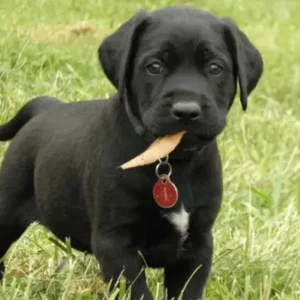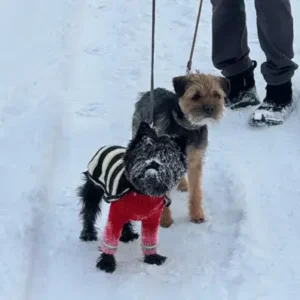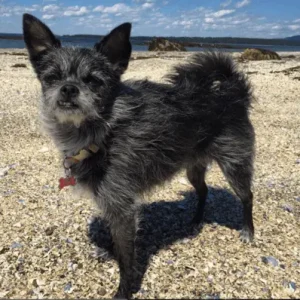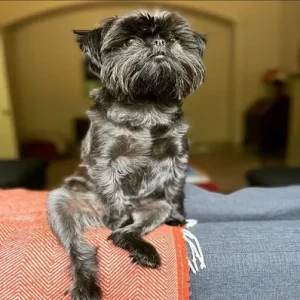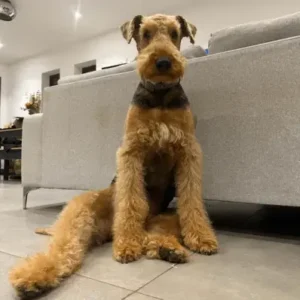Boston Terrier History/Origin
In 19th-century England, blood sports led to a trend of crossing terriers with bull-type breeds. Around the late 1860s in Liverpool, a Bulldog and the now-extinct white English Terrier were crossed, producing a tough dog named Judge.
The judge’s owner sold him to American William O’Brien, who brought him to the United States, Boston. In 1870, O’Brien sold Judge to Bostonian Robert C. Hooper. Known as ‘Hooper’s Judge,’ this purebred dog became the patriarch of the Boston Terrier breed and an ancestor to nearly all true Bostons.
A breed historian described Judge as a ‘strongly built, high-stationed dog of about thirty-two pounds.’ He was dark brindle with a white stripe on his face. He had a square, blocky head, and a nearly even mouth, resembling the modern Boston Terrier.
Hooper bred Judge to Burnett’s Gyp, a small white female owned by Edward Burnett of Southboro, Massachusetts. Their offspring, Well’s Eph, begot Tobin’s Kate, leading to the foundational generations.
Selective breeding transformed the bulky fighter into a smaller, friendlier companion dog called the Round Head.
The breed name was changed to Boston Terrier in honor of their city of development. The Boston Terrier Club of America was formed in 1891. Two years later, the AKC registered its first dog of the breed under Non-Sporting Group.
Boston Terrier fanciers in Pasadena 1920- Source: AKC.org
Today, they are a symbol of hometown pride. Boston University has had the Boston Terrier as its official mascot for nearly 100 years. 1979 Massachusetts named the ‘American Gentleman’ its official state dog.
Boston Terrier Personality
Known as the American Gentleman, the Boston Terrier is one of the dog breeds that is lively, smart, and affectionate. They thrive on human companionship and enjoy being a part of family activities. These charming dogs are also known for their intelligence and eagerness to please, which makes them great companions.
- Temperament
Boston Terriers have a gentle, even temperament. They are friendly and sociable, getting along well with children and other pets. Their adaptable nature makes them suitable for various living environments, including apartments.
These dogs are known for their playful and spirited demeanor, bringing joy and entertainment to their families.
- Potential Challenges
Training a Boston Terrier can be challenging due to their occasional stubbornness. Persistence and consistency are crucial for effective training. Additionally, early socialization is essential for this breed.
Exposure to different people, sights, sounds, and experiences during puppyhood is essential. It helps ensure that the dog grows up to be a well-rounded dog. Proper socialization also builds their confidence and prevents behavioral issues. Without proper socialization, they may develop behavioral issues.
Boston Terrier Physical Appearance
The Boston Terrier is a lively and highly intelligent dog with a smooth coat, short head, compact build, and short tail. This well-balanced breed is sturdy, avoiding a spindly or coarse appearance.
Its bone and muscle are proportionate to its weight and structure, enhancing its overall form. The legs and body length are balanced, giving a distinctive square appearance. It has strong, neatly turned limbs and a short tail.
- Size
Boston Terriers are considered small size dogs. They fall into three weight categories:
- Under 15 pounds
- 15 to 19 pounds
- 20 to 25 pounds
They usually stand 12 to 17 inches tall at the shoulder. Regardless of their weight, they should appear sturdy, never skinny or spindly.
- Coat color
The Boston Terrier is characterized by a short, smooth coat that is both bright and fine in texture, contributing to its sleek appearance. Accepted coat colors for this breed include brindle, seal, or black, with white markings. This coat pattern and coloration are distinctive features of this breed, emphasizing its elegant and classic appearance.
Boston Terrier Gender Differences
Adult male Boston Terriers stand 15 to 17 inches tall on average and weigh 10 to 25 pounds. Females are typically 9 to 15 inches tall and weigh 9 to 20 pounds, often with a leaner build than males. Both of them have the same life span of 13 years.
Boston Terrier Feed/Nutrition
Boston Terriers typically require 0.5 to 1.5 cups of high-quality dry food per day, split into two meals. The amount your adult dog needs depends on factors like size, age, metabolism, and activity level.
Just like people, dogs have individual dietary needs; active dogs may require more food than sedentary ones.
Choosing high-quality dog food is crucial as it provides better nutrition, requiring smaller servings to keep your dog healthy. They can tend to overeat, so it’s important to monitor their weight to prevent obesity.
Additionally, their diet can influence flatulence, so feeding them high-quality food can help minimize this issue. You can occasionally offer tomatoes as a treat, but make sure they are served in moderation and without the leaves or stems.
Boston Terrier Health
Boston Terriers, like all breeds, can be prone to certain health conditions. Not all dogs of this breed will develop these diseases, but it’s important to be aware of them if you’re considering this breed. When purchasing a puppy, ensure the breeder provides health clearances for both parents.
Common health issues include:
- Cataracts: Cataracts in dogs are characterized by the clouding of the eye’s lens, which can impair vision. Boston Terriers are prone to both juvenile (developing between 8 weeks and 12 months) and adult cataracts. Early detection through veterinary examination is crucial for appropriate management.
- Patellar Luxation: Also known as “slipped stifles,” this condition affects the knee joint where the patella (kneecap) slides out of its normal position. It can range from mild to severe, causing varying degrees of lameness and discomfort. Severe cases may necessitate surgical correction to realign the patella.
- Heart Murmurs: Heart murmurs are abnormal sounds heard during the heartbeat, typically due to turbulent blood flow through the heart valves or chambers. In Boston Terriers, murmurs over the mitral valve are common. Depending on severity, treatment may involve diet modifications, medication, and regular monitoring by a veterinarian.
- Deafness: Boston Terriers, especially those with extensive white markings, can be prone to congenital deafness affecting one or both ears. Breeding practices and genetic testing can help reduce the incidence of deafness in the breed. Deaf dogs can lead fulfilling lives with proper training and care.
- Allergies: Boston Terriers may suffer from various allergies, including environmental allergens (like pollen or dust mites) and food allergies. Symptoms can include itching, skin irritation, ear infections, and gastrointestinal issues. Diagnosis involves eliminating potential allergens through diet trials or allergy testing.
- Megaesophagus: This condition involves dilation and poor motility of the esophagus, causing difficulties in swallowing and regurgitation of undigested food. Management typically includes feeding upright or using special feeding devices to help food pass into the stomach properly.
- Reverse Sneezing: Reverse sneezing is characterized by rapid and noisy inhalations through the nose. It can be triggered by excitement, irritation of the throat, or nasal discharge. Usually harmless, episodes can be shortened by calming the dog or gently massaging the throat.
Understanding these conditions empowers owners to monitor their dog’s health closely. They should seek veterinary care promptly if any symptoms arise. Genetic testing, when applicable, can help identify predispositions early.
This proactive approach aids in effectively managing or minimizing the impact of these health risks on their pet’s well-being.
Boston Terrier Care and Grooming
Grooming a Boston Terrier is simple. Brush their short coat weekly with a firm bristle brush and bathe as needed. Due to their prominent eyes, daily face washing is important to prevent irritation.
Regular brushing keeps shedding minimal, and brushing their teeth two to three times a week helps prevent dental issues. Trim nails monthly, and check their ears weekly for redness or odor, cleaning with a damp cotton ball if needed.
In terms of exercise, Boston Terriers need high activity. Daily walks and playtime are usually enough to keep them fit and happy. They’re an active breed so require excessive exercise, making them suitable for both apartment living and homes with yards.
Regular activity helps maintain their overall health, especially since they’re a brachycephalic breed with a short muzzle. To ensure a balanced routine, include training your dog to stop barking, as consistent training can help them develop better behavior.
Boston Terrier Rescue Groups
Rescuing Boston Terriers is a noble endeavor that provides a second chance to dogs in need of loving homes. Many dogs are waiting for adoption or fostering opportunities, often through local rescues or breed-specific organizations. If you’re considering adopting, reach out to these rescues or clubs to find a dog who could become your new best friend.
Boston Terrier Price
The price of a Boston Terrier typically ranges from $600 to $1,200, depending on factors such as breeder reputation, pedigree, and location.
When seeking to purchase a Boston Terrier, it’s crucial to prioritize ethical breeding practices. Look for reputable breeders who prioritize the health and well-being of their dogs, ensuring they receive proper care and genetic testing.
Interesting Facts
- The Boston Terrier originated in Southborough, Massachusetts but gained popularity in Boston’s Beacon Hill neighborhood in the 19th century.
- Helen Keller, the renowned educator and activist who was blind and deaf, had a Boston Terrier named Sir Thomas (also known as “Phiz”). The dog accompanied Keller during her lectures at Radcliffe College.
Helen Keller with Boston Terrier- Source: Pinterest
- They have been featured in the Breed Judging Show in 2024.
- Reese Witherspoon has a Boston Terrier as a pet.
Reese Witherspoon with her Boston Terrier- Source: reesewitherspoon
Best For
Boston Terriers are best suited for individuals and families looking for a friendly and adaptable companion. They thrive with affection and moderate exercise, making them suitable for various lifestyles, including active and quieter environments. Their small to medium size makes them ideal for singles, couples, families with children, and elderly individuals.
Top Names
| Male Boston Terrier Names | Female Boston Terrier Names |
| Rocky | Bella |
| Buster | Daisy |
| Charlie | Lucy |
| Max | Sadie |
| Toby | Molly |

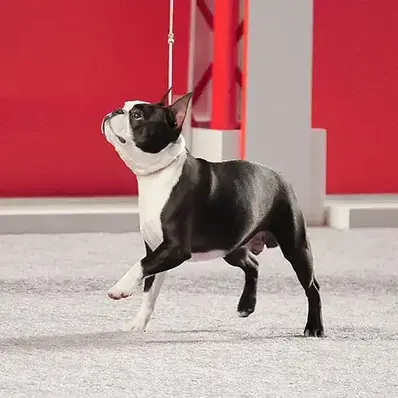







 Red Bulldog – Source:
Red Bulldog – Source:  White English Terrier- Source:
White English Terrier- Source:  Boston Terrier fanciers in Pasadena 1920- Source:
Boston Terrier fanciers in Pasadena 1920- Source: 

 Black Boston Terrier with White markings- Source:
Black Boston Terrier with White markings- Source:  Brindle Boston Terrier with White markings- Source:
Brindle Boston Terrier with White markings- Source:  Black Boston Terrier Puppy- Source:
Black Boston Terrier Puppy- Source: 
 Helen Keller with Boston Terrier- Source:
Helen Keller with Boston Terrier- Source:  Reese Witherspoon with her Boston Terrier- Source:
Reese Witherspoon with her Boston Terrier- Source: 

